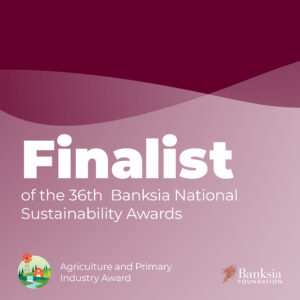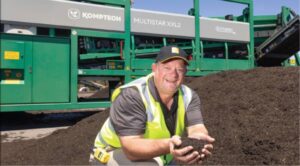Lachy McLeay Vineyard Manager, Vasse Felix Wines Margaret River
Lachy McLeay started his career in the wine industry 9 years ago in South Australia after obtaining his degree from Adelaide University at the WAITE Research Institute campus. Upon graduating he took up work with the Fosters Group and was involved in their wineries right around Australia including the major wine regions such as Coonawarra, McLaren Vale and Margaret River.
Lachy recently made a move from the large multi national corporate operations of Treasury Wine Estates to Vasse Felix the oldest winery in Margaret River. Vasse has 4 vineyards across the region and recently acquired a new one, which has become Lachy’s project. The role is to manage the vineyard which includes building soil health. “There is a strong relationship with the winemaking team and we deal with the grape growing side with input from them about their requirements. We then hand over the grapes at vintage to the wine makers.” He said.
Historically Margaret River was born of research that highlighted that this part of Western Australia had a similar climate to that of Bordeaux, a premium wine growing area of France. “That’s why there’s a lot of Cabernet and Merlot wines coming out of this region. One of the bonuses is that it also makes really good Chardonnay. Now the Margaret River region is renown for its production of Cabernet and Chardonnay.” He commented.
Vasse Felix has a strong emphasis on Cabernet and Chardonnay as well as the other styles that the region does well including Sauvignon Blanc, Semillon and Shiraz.
I asked Lachy about his involvement with composted products in his work?
He pointed to the example used in the C-Wise Vineyard Soil Health Seminar at Voyager, of the Treasury Wines Estates Fleureau, South Australia project where he worked very closely with the vineyard managers as they trialed the use of compost.
This work was aimed to reduce evaporation losses, increase soil health, improve soil structure and reduce under-vine temperatures using two different composted products, applied as mulch. They achieved water savings and improved drought resistance in their vines. There was some yield improvment as well as significant increases in organic carbon in the soil profile. While there was a 2-3 year payback time the benefits lasted between 3 to 5 years.
“While I was there I saw the benefits and the managers spoke so highly of using compost in their vineyards. They were banding under the vine in large volumes and even going so far as mechanically trenching compost in under the wheel tracks to get it into the root zone.” He said.
“I had a lot to do with compost use there and the mechanics of putting it out into the vineyard. While I was there we used plant cell density information, which gives spatial variability within vineyards and doing targeted ‘within block’ applications of compost. We would use prescription maps to target specific areas to treat.”
Lachy went on to say – “vineyard variability can be a huge issue especially in the Margaret River area where you have such undulating country and huge differences in soil types. If you have one variety crossing over such soil variations it can produce huge differences in vine behavior. This has a flow on effect to the quality of the wine from that block. Anything that a vine manager can do to even out the variation in those blocks becomes a valuable tool.


Fertile vineyard soil with good crumb structure Healthy new spring growth
“At Fleurieu we were using compost in two main areas – one for general vineyard health and water savings, with mulch placed under vines. The second was as a targeted tool to overcome variability within blocks. Some areas would get a broadcast for general health and another area would get a really heavy band of compost underneath to try to build vigour and hold onto more water if it had lighter soil types.”
Since coming over to WA he has seen at first hand how compost applications work in vineyards, particularly with the sandier soils we have here. “While I am very new at Vasse Felix I am looking to incorporate compost into the soil management system.” He mentioned.
Vasse Felix has just placed their first order for mulch products with C-Wise so it looks as though Lachy’s passion for compost is making an impact.







